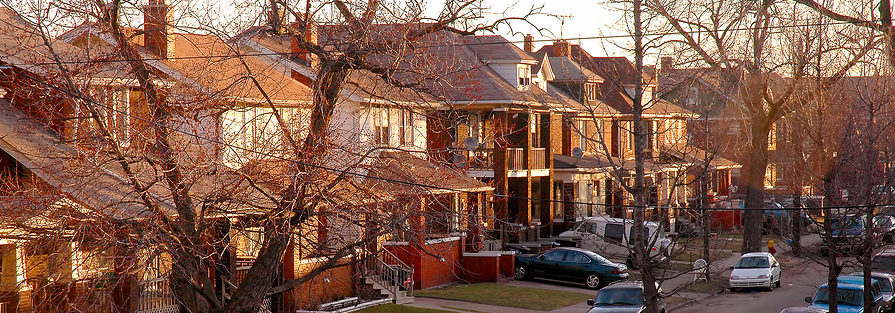Source: Michigan News

Neighborhood streets of residential Detroit neighborhood. Image courtesy: U-M Poverty Solutions

Neighborhood streets of residential Detroit neighborhood. Image courtesy: U-M Poverty Solutions
Increasing awareness of a program designed to prevent foreclosure among low-income homeowners in Detroit and making the application process easier are among the recommendations to help residents stay in their homes, according to a new University of Michigan report.
The report examines ways state and local governments can improve the implementation of a Michigan state law known as the poverty tax exemption, and Detroit’s version of the of the policy, the Homeowners Property Tax Assistance Program.
The program can help reduce property taxes for homeowners living at or near the poverty level. By lowering or eliminating tax bills, the program can improve housing affordability and prevent tax foreclosure among owners with low- and fixed-incomes, as well as those experiencing financial hardships.
Each year, about 40,000 owner-occupied households in Detroit are eligible for the exemption, but just over 5,500 individuals applied for an exemption in 2017, with roughly 5,200 people being granted some sort of relief.
“While the rate of owner-occupied tax foreclosures has declined significantly in recent years, the problem is far from over. Thousands of homeowners now face a dual tax burden—owing property taxes for both current and past years,” said Alexa Eisenberg, a doctoral student at U-M’s School of Public Health and lead author of the report.
“Improving access to this exemption can put an end to the cycle of unaffordable tax obligations and the devastation caused by foreclosure.”
Eisenberg and Roshanak Mehdipanah, assistant professor of health behavior and health education at the School of Public Health, partnered with the United Community Housing Coalition, a nonprofit in Detroit, to examine how the city’s program was meeting the needs of Detroit residents through interviews with more than 100 eligible homeowners.
The project was supported by U-M’s Poverty Solutions initiative and the Detroit Urban Research Center.
U-M researchers found that while the poverty tax exemption provides critical relief to homeowners who face severe housing cost burdens, these benefits are not guaranteed.
Among the study’s key findings:
- Exemption-eligible homeowners face debt and foreclosure for taxes they could have been exempt from paying: Among those who had never previously applied to the program, 82 percent indicated they qualified for relief for the past three years. Among them, 84 percent owed tax debt to the Wayne County Treasurer and 70 percent were subject to foreclosure.
- Limited awareness is a significant barrier to program access: 76 percent of those who were eligible for the program in the past three years indicated they did not apply because they didn’t know it existed.
- Homeowners face considerable barriers at each stage of the application process stemming from the application’s complex documentation requirements and procedural demands. Counseling services such as those offered by UCHC help homeowners navigate the exemption process but place an additional burden on homeowners and nonprofit organizations.
In December 2018, the Detroit City Council approved an ordinance to solidify and expand changes to the tax exemption program to improve access for low-income Detroit homeowners.
“The Poverty Tax Exemption is an invaluable tool in the fight against tax foreclosure,” said Michele Oberholtzer of the United Community Housing Coalition. “It can be the difference between losing or keeping a home. We welcome changes that reduce barriers for the poverty exemption so that no Detroiters will lose their home for taxes they should not have had to pay.”
The report provides recommendations that state and local governments can take to ensure that the poverty tax exemption is readily available, easily obtainable and equitably provided to all eligible homeowners.

